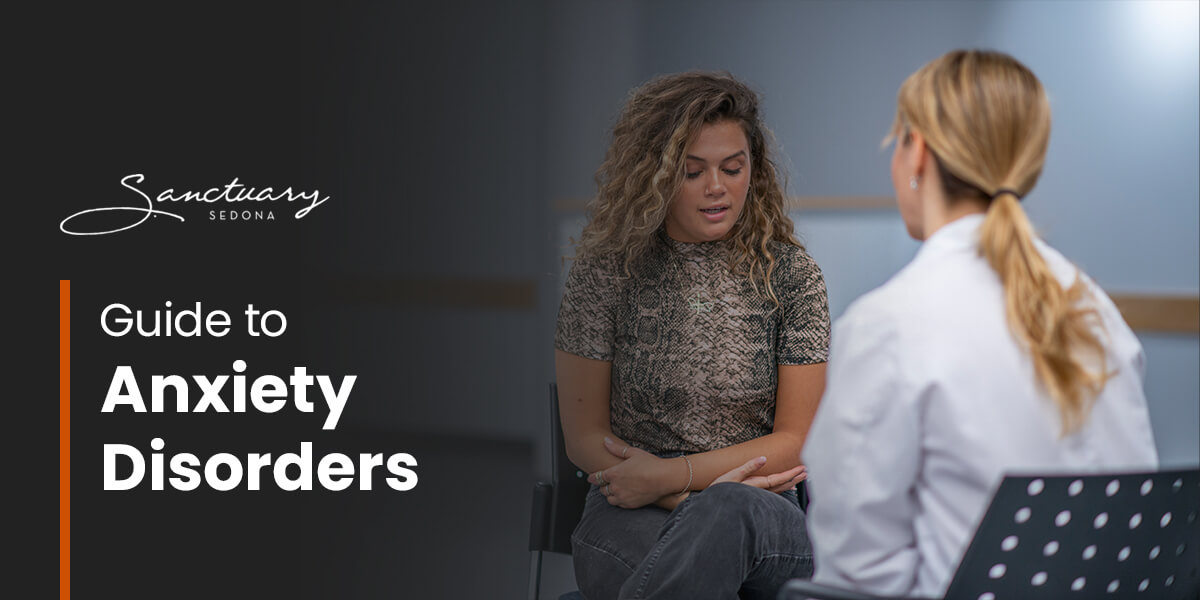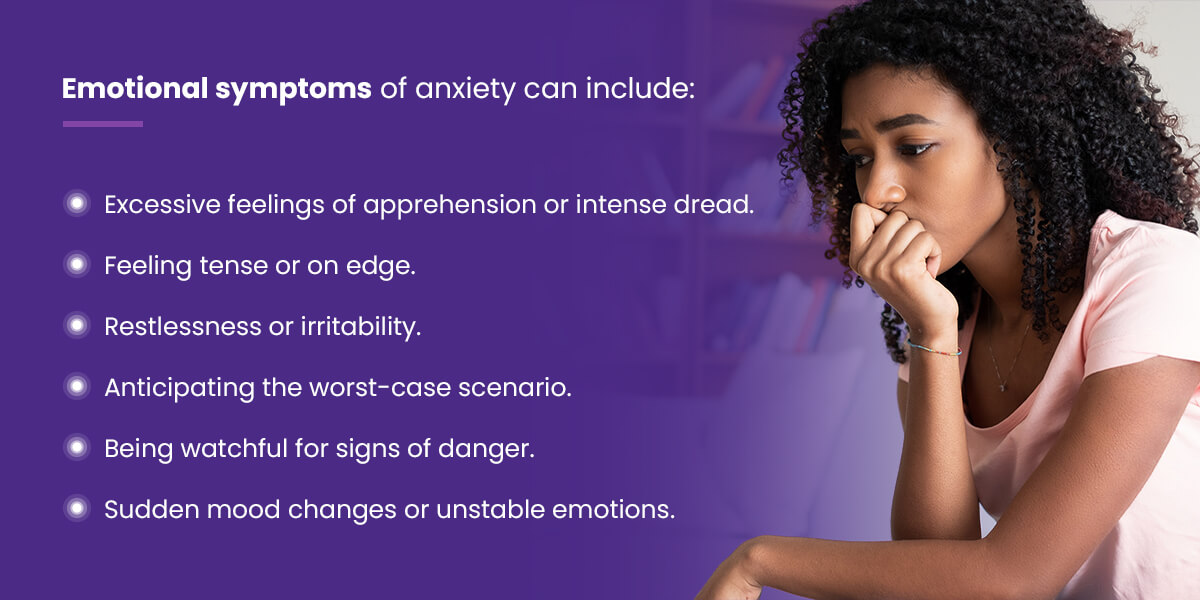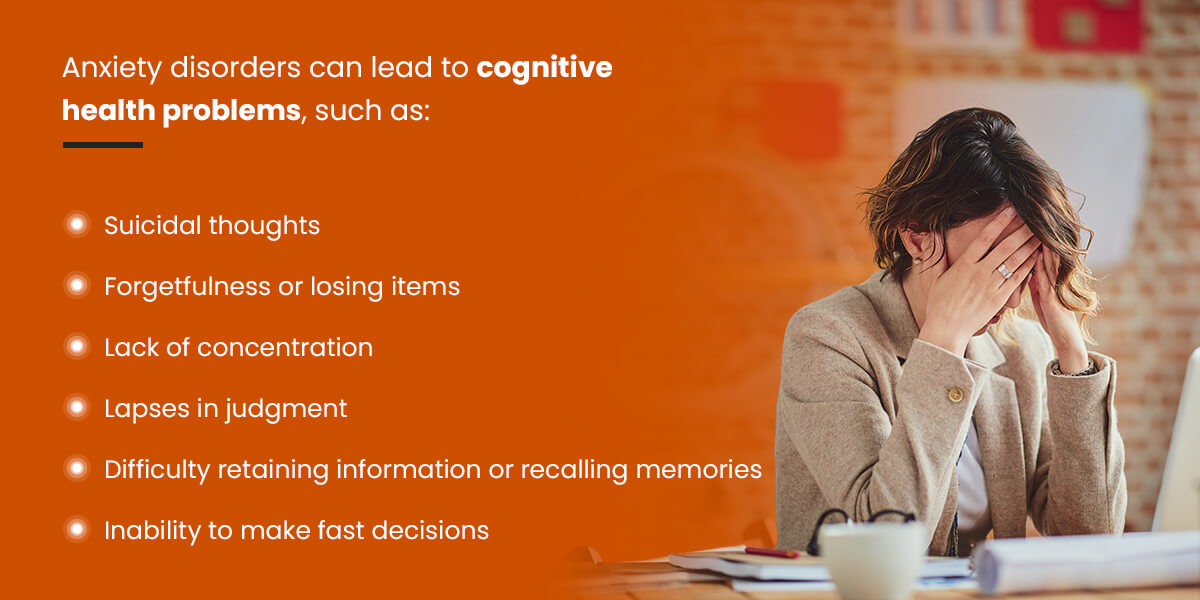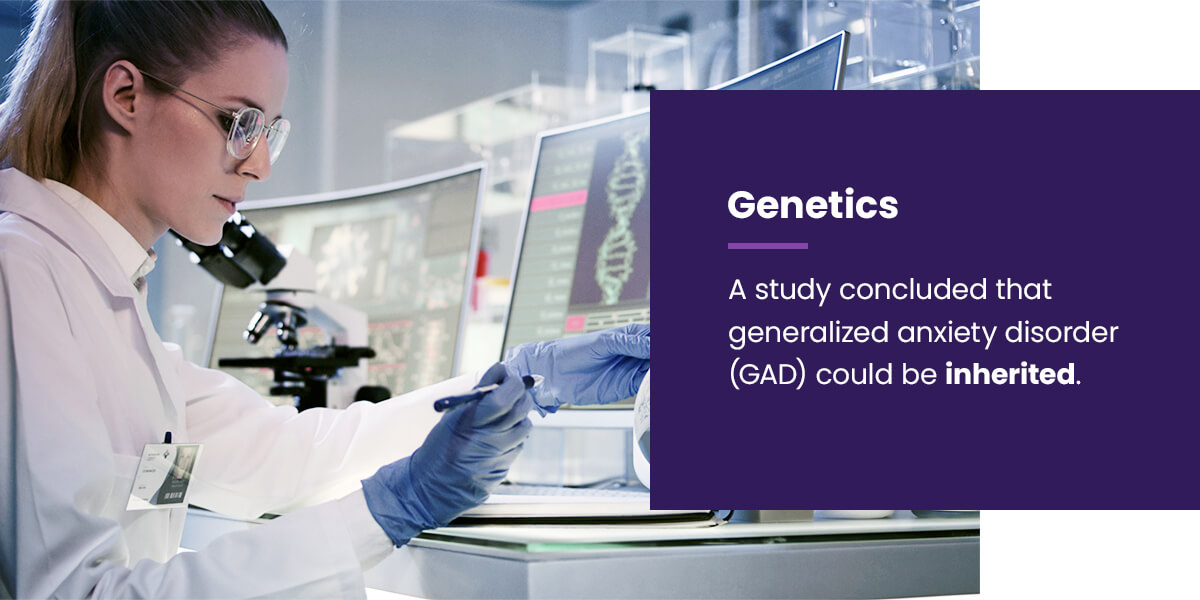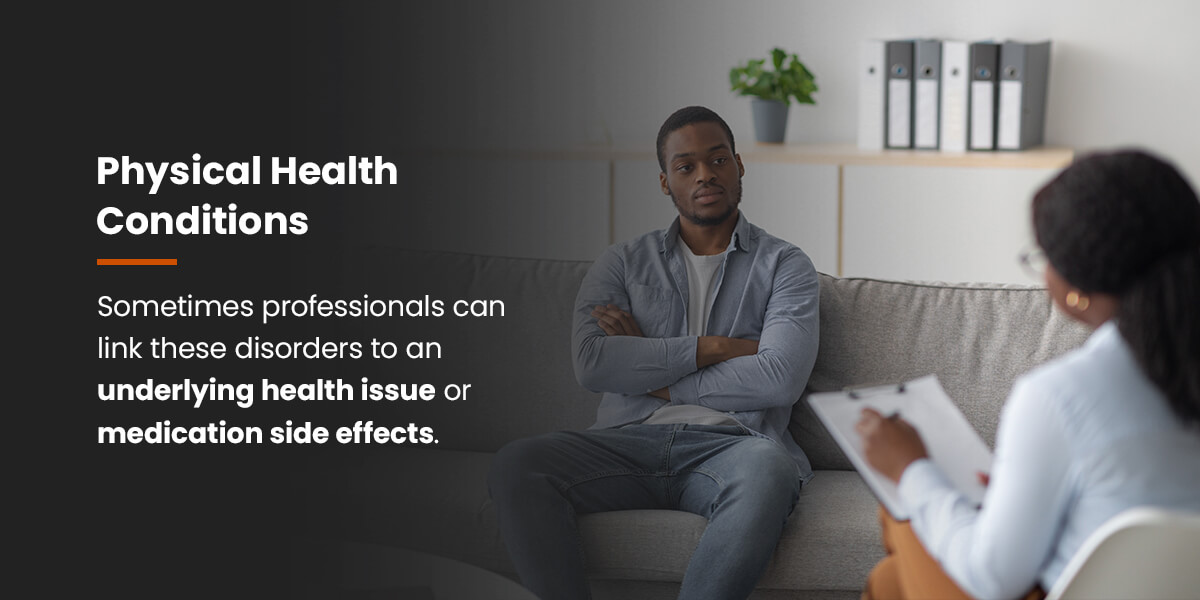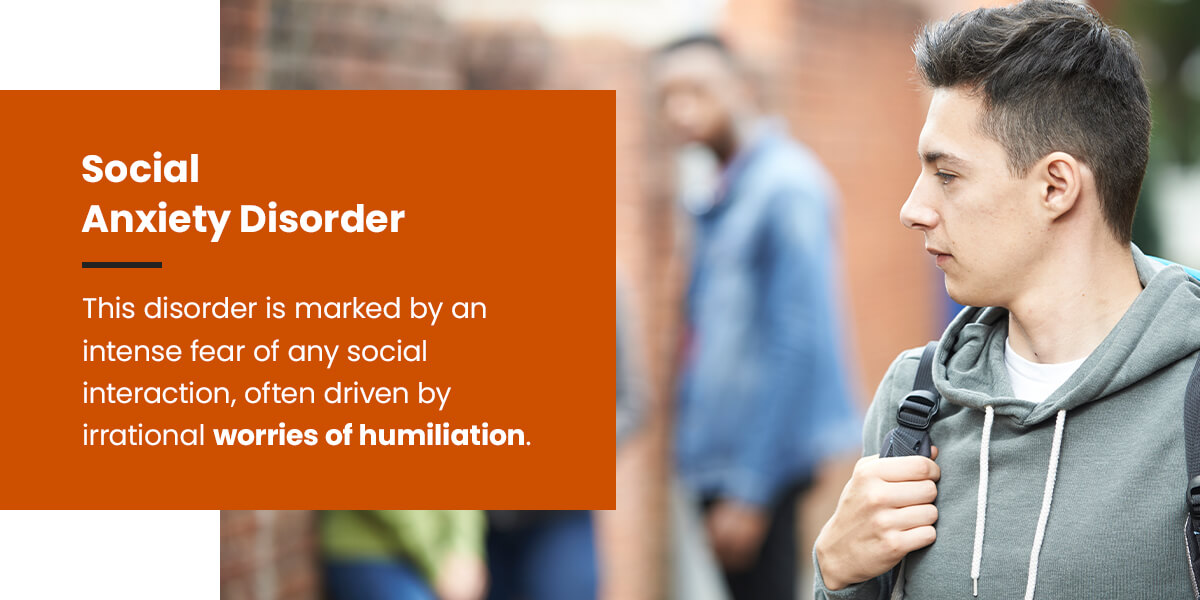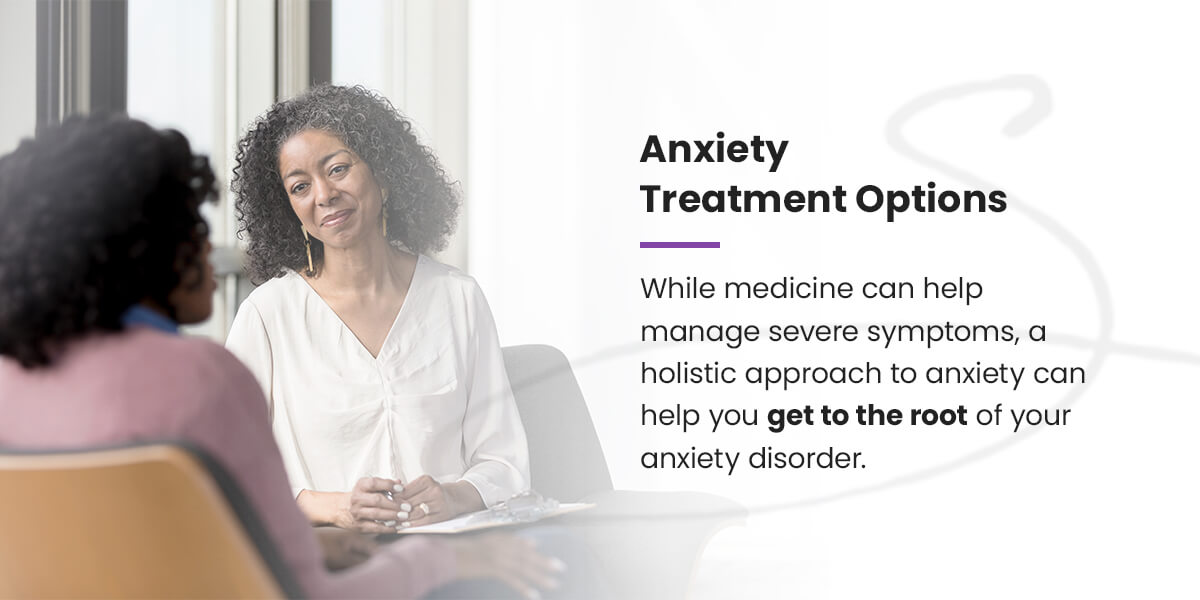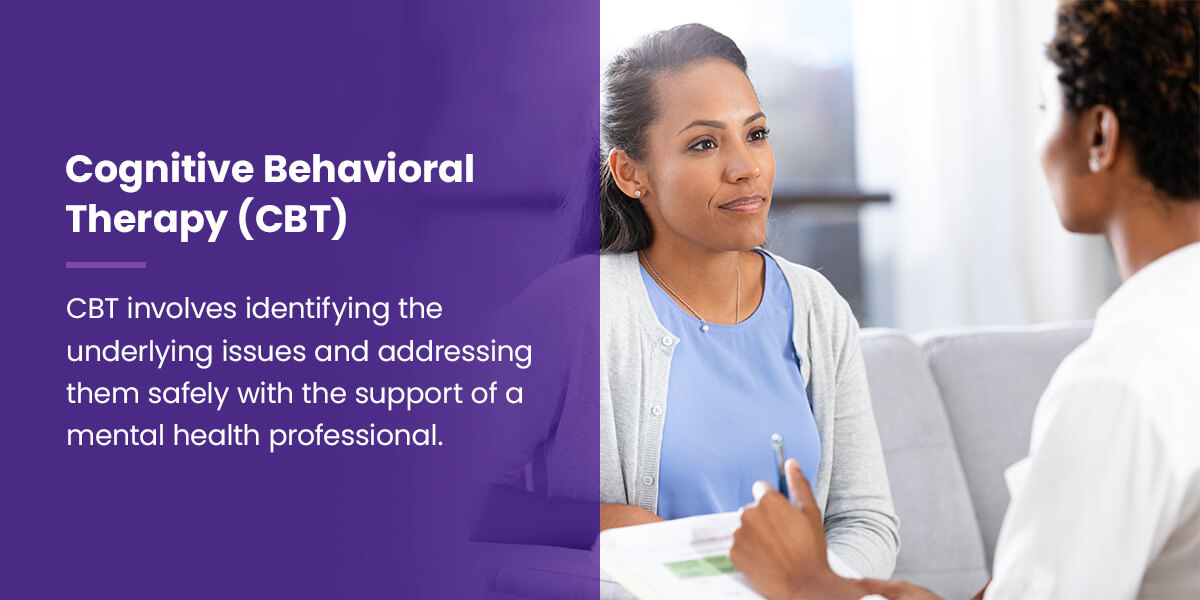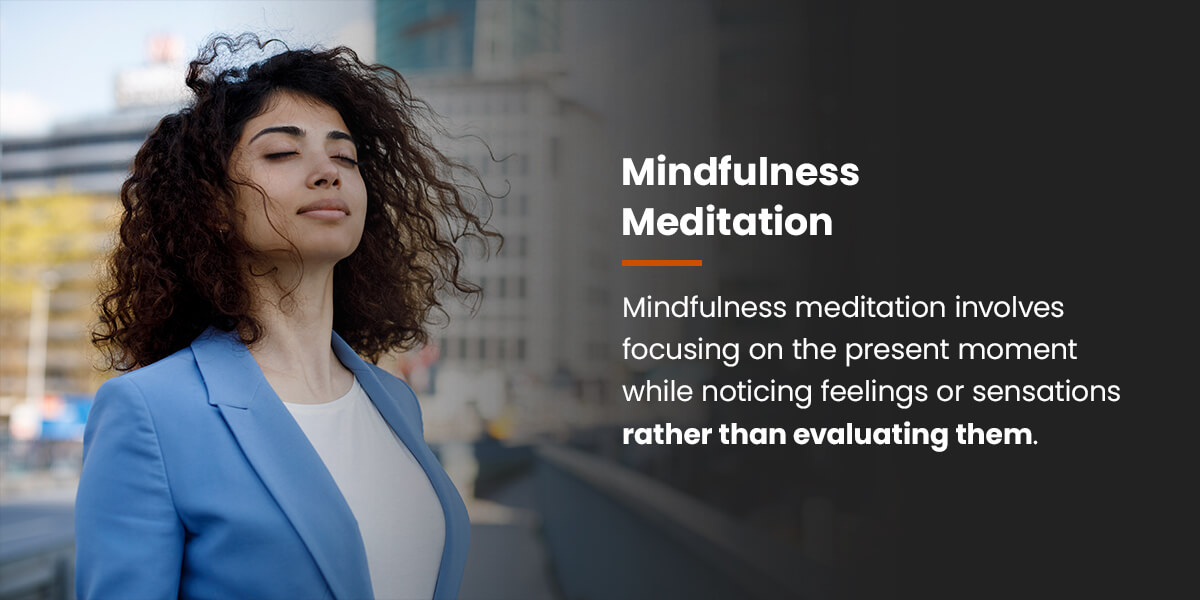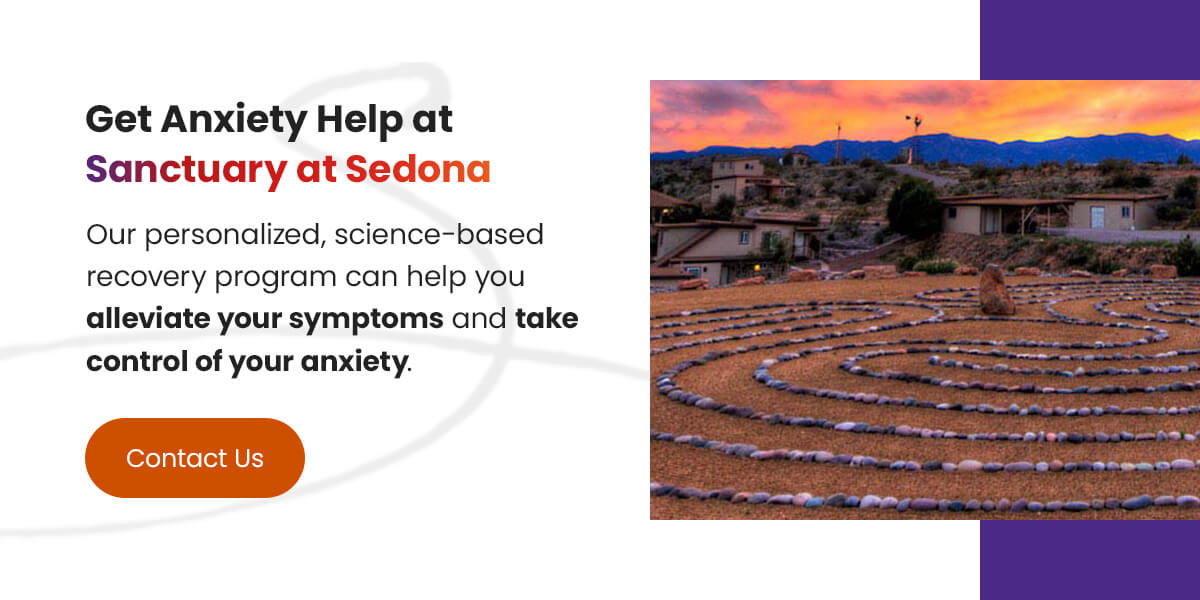Over 40 million people suffer from anxiety disorders, making it the most common mental health condition in the U.S. While we all experience anxiety from time to time, an anxiety disorder can develop when intense feelings of fear and distress become debilitating. You might suffer from an anxiety disorder if your symptoms interfere with everyday life, from job performance to schoolwork and relationships.
Generalized anxiety disorder, social anxiety disorder and panic disorder are three types of anxiety disorders. Thankfully, you’ll find several recovery methods if you or a loved one struggles with these conditions.
Learn the symptoms, causes and effective treatment options for anxiety disorders to find much-needed relief.
Signs and Symptoms of Anxiety
Anxiety disorders are a combination of related mental health conditions. While symptoms differ between each condition, all have one thing in common — excessive worry or fear in non-threatening situations.
The severity of these symptoms can depend on the person and the type of event that causes anxiety. You might have an anxiety disorder if you notice any of these emotional, physical, behavioral or cognitive warning signs or symptoms:
Emotional Symptoms
Some of the psychosocial or emotional symptoms of anxiety can include:
- Excessive feelings of apprehension or intense dread.
- Feeling tense or on edge.
- Restlessness or irritability.
- Anticipating the worst-case scenario.
- Being watchful for signs of danger.
- Sudden mood changes or unstable emotions.
Physical Symptoms
The physical effects of anxiety can be debilitating and significantly impact one’s daily life. Symptoms can include:
- Racing or pounding heartbeat
- Shortness of breath
- Upset stomach
- Frequent urination or diarrhea
- Sweating, twitches or tremors
- Fatigue and insomnia
- Headaches
- Inability to relax
- Body tension
Behavioral Symptoms
When anxiety disorders are left untreated, the symptoms can cause behavioral changes that affect a person’s day-to-day life. Behavioral effects of anxiety might include:
- Refusing to participate in previously enjoyed activities.
- Neglecting daily responsibilities.
- Skipping work, school or other obligations and events.
- Crying or tearfulness.
- A decline in work or school performance.
- Isolating oneself from family or friends.
- Aggression or sudden irritability.
- Suicide attempts.
Cognitive Symptoms
Over time, anxiety disorders can lead to cognitive health problems, such as:
- Suicidal thoughts
- Forgetfulness or losing items
- Lack of concentration
- Lapses in judgment
- Difficulty retaining information or recalling memories
- Inability to make fast decisions
Causes and Risk Factors of Anxiety Disorders
While the exact cause of anxiety disorders is unknown, experts believe it could come down to several factors. Life changes such as traumatic events appear to trigger them, while inherited traits can also be a factor. Other anxiety disorders might stem from significant life changes such as losing a job or the end of a romantic relationship.
The following is an outline of the many causes and risk factors that may influence the development of anxiety disorders:
Genetics
Growing research suggests that genetic features might play a role in developing an anxiety disorder. In fact, a 2019 study found that if you have specific genetics, you might be more prone to anxiety. Another study concluded that generalized anxiety disorder (GAD) could be inherited, with GAD and associated conditions linked to specific genes.
When talking about genetics, there are a few risk factors involved in the development of anxiety disorders:
- Temperamental traits like shyness in childhood: Children with behavioral inhibition will display fearful or avoidant behavior when around unfamiliar people or situations. These temperamental traits seem to translate into anxiety disorders when the child becomes an adult, though most people develop anxiety before turning 21.
- History of anxiety or related mental health conditions among relatives: If someone in your family has an anxiety disorder, you may also have a greater risk of developing one. The odds of this can increase if it’s a close family member, such as a parent.
- Personality: People with certain personality types are more prone to anxiety disorders than others. Neuroticism and perfectionism, for example, are all traits that seem to be linked to anxiety disorders. Additionally, those who are hypercritical of themselves, highly introverted and experience negative feelings are more likely to develop anxiety disorders like GAD, agoraphobia, panic disorder and major depressive disorder.
Environmental Factors
While genetics can play a role in anxiety disorders, your environment can also dictate certain mental conditions. Suppose you’ve recently witnessed a traumatic event or are close to someone who has. In that case, you’re at a higher risk of developing acute stress disorder (ASD), while ongoing symptoms might be a sign of something even more severe, like post-traumatic stress disorder (PTSD).
Symptoms might develop shortly after the traumatic event. However, some might not appear for months or even years later. They might include flashbacks, bad dreams, angry outbursts or avoiding situations that trigger anxiety symptoms.
Mental health researchers have also discovered that when children witness a traumatic event, it could increase their risk of developing anxiety later in life. Traumatic experiences or events can include mental or physical abuse, neglect, abandonment, divorce or prolonged illness.
Other environmental factors that can put you at risk of an anxiety disorder might include:
- Participating in military combat
- Racial discrimination or violence
- Sexual harassment or gender discrimination
- Gender dysphoria
Significant Life Events
Like trauma, significant life events or changes can lead to anxiety or adjustment disorders. Usually, this type of anxiety will dissipate over time, though some may develop into a severe issue if left untreated.
Environmental factors that might exacerbate symptoms of anxiety and adjustment disorder include:
- Experiencing community violence or crime
- A natural disaster such as a fire or flood
- Retirement and significant life changes
- Diagnosis of a chronic illness
- Losing a child or becoming a parent
- Losing a job
- Problems at school or work
- Changes in occupational goals
- Injury or illness
- Conflict in marriage or any relationship
- Losing a loved one
- Spending time in the criminal justice system
- Moving into a new house or getting married
Physical Health Conditions
A combination of genetics and environmental stressors leads to anxiety, but sometimes professionals can link these disorders to an underlying health issue or medication side effects. If you don’t have biological relatives with an anxiety disorder, have no history of having it and your anxious symptoms seem unrelated to life events, doctors can evaluate you for underlying health problems that might cause or worsen anxiety.
Examples of medical problems that can be linked to anxiety or aggravate symptoms can include:
- Heart disease
- Diabetes
- Chronic pain
- Drug misuse or withdrawal
- Thyroid problems
- Irritable bowel syndrome
- Respiratory disorders, like asthma
- Withdrawal from alcohol or anti-anxiety medications
- Rare tumors that produce certain fight-or-flight hormones
Effects of Anxiety on Your Life and Those Around You
Anxiety may go away after a triggering event ends, though it can reoccur depending on your life circumstances. If a life ch ange or stressor caused your anxiety, your symptoms may improve in a few months. On the other hand, if you continue to endure trauma and stressors, your symptoms can compound and cause your anxiety to become long-term. If left unaddressed, the disorder can worsen and significantly disrupt your life and those around you.
Anxiety disorders may lead to the following:
- Job termination: When anxiety worsens, it can turn into agoraphobia or other conditions that make it difficult to leave the house and attend work. This side effect could result in job termination and financial difficulties, which can worsen your anxiety disorder.
- Unpredictable mood swings: Anxiety and apprehension activate the stress response. When an anxiety disorder causes frequent stress responses in the body, these hormones can affect our mood and result in unpredictable excitability, anger or sadness.
- Suicidal thoughts or behaviors: Often, anxiety can worsen into a depression that, if left untreated, might lead to suicidal thoughts or behaviors. If you or someone you know has worsening depressive symptoms or thoughts about hurting themselves, it’s essential to seek immediate help.
- The onset of other mental health disorders or complications: Anxiety can worsen and lead to other mental health disorders or complications, such as separation anxiety disorder, substance use disorder or insomnia. At this point, you’ll need to seek treatment for your anxiety as well as co-occurring disorders.
- Lost interpersonal relationships: Struggling with an anxiety disorder can make it challenging to keep up with relationships. You may isolate yourself to avoid social interaction and lose contact with loved ones. Additionally, mood swings may cause those around you to distance themselves from you, which can lead to further isolation.
- Lower performance at work or school: You might have difficulties overcoming the physical symptoms of your disorder and find your performance at work or school slipping. Those with anxiety might notice failing grades when they find it difficult to attend school. At the same time, social anxiety can make it challenging to participate in work meetings and offer ideas.
- Lowered social contact: Due to the possibility of developing social phobias, agoraphobia or social anxiety, disorders can cause fewer social interactions in general. Losing touch with friends, family and acquaintances can significantly affect one’s mental and physical health and lead to loneliness and depression.
Anxiety can significantly affect your quality of life and the people around you. If left unaddressed, symptoms may become more challenging to manage and impact your daily routines, relationships and mental health.
Anxiety and Co-Occurring Disorders
As we’ve touched on, an anxiety disorder can often occur alongside other mental health concerns. Experts have noticed that you more than likely suffer from other conditions if you have anxiety. Co-occurring disorders can include:
Social Anxiety Disorder
Social anxiety disorder is more intense than just shyness. This disorder is marked by an intense fear of any social interaction, often driven by irrational worries of humiliation. People with social anxiety will often avoid interacting in conversations, class discussions, work meetings and other forums for fear of being rejected or saying the wrong thing.
For these reasons, just the anticipation of social interaction can cause those with a social anxiety disorder to experience panic attacks and they’ll often cope by isolating themselves. Fear, nervousness and avoidance become part of this person’s everyday life as social anxiety disrupts their relationships and routines.
Panic Disorder
Panic disorder is an anxiety disorder marked by episodes of intense fear alongside physical symptoms like dizziness, shortness of breath, abdominal distress, heart palpitations and chest pain. The symptoms might linger for a couple of hours and can often be confused for a heart attack or stroke. Other signs of panic disorder might include:
- Trembling
- Throat tightness
- Headache
- Chills or hot flashes
- A fear of dying
- Numbness or tingling
- A choking feeling
Panic attacks caused by this disorder occur independently without triggers, stressors or any sign of immediate danger. People who have panic disorder often attribute their attacks to the situations or places they were when they occurred. This can turn into agoraphobia or a fear of leaving the house or being in public places.
Generalized Anxiety Disorder (GAD)
Those who struggle with GAD experience chronic worrying about everyday life. This worrying about uncertainties can consume all hours of the day and make it difficult to focus on tasks and life obligations. People with GAD might experience restlessness, headaches, nausea and body tension due to the affliction and become exhausted by their worries over time. They often anticipate disaster and experience excessive concerns about money, health, relationships, work or school.
GAD is often associated with other mental health conditions like obsessive-compulsive disorder (OCD) and panic disorder. More than 6.8 million adults in the U.S. struggle with it today and most find its symptoms begin in the life stages between childhood and middle age.
Phobias
We all tend to avoid situations that make us uncomfortable. However, for someone with a phobia, specific events, places or objects trigger powerful reactions of intense, irrational fear. These reactions can be caused by several different things, with most people with phobias working hard to avoid their triggers and reduce symptoms. These attempts to control fear can completely take over a person’s life.
Anxiety Treatment Options
If you or a loved one is struggling with an anxiety disorder, you’ll be happy to know that several effective treatment options can provide relief. While medicine can help manage severe symptoms, a holistic approach to anxiety can help you get to the root of your anxiety disorder.
Holistic treatment centers often draw their treatment methods from traditional forms of therapy such as cognitive-behavioral therapy (CBT) or psychodynamic therapy. At most alternative treatment centers, you’ll discover ways to quell cognitive distortions and increase positive self-talk. Clients learn to identify and alleviate their stressors and move forward with a healthier mind and body.
Most treatment centers will employ an integrative approach or use peer-reviewed science and spiritual traditions for a broader recovery. While holistic care centers personalize plans based on your needs, some alternative treatments for anxiety can include:
Nutrition Education
Studies suggest that nutritious meals and healthy eating patterns that fit dietary recommendations can treat and prevent depression and anxiety. To help treat anxiety disorders, The Sanctuary at Sedona will provide nutrition education and gourmet nutritious meals during your treatment.
For example, research has shown these dietary approaches can reduce anxiety:
- Omega-3 fatty acids can regulate dopamine and serotonin transmission, which has been shown to help decrease anxiety.
- Taking B vitamins, vitamin C, zinc and magnesium have been linked to a lower risk of anxiety disorders.
- Diets high in vegetables and fruit and low in saturated fats can decrease the risk of anxiety.
Further, the following dietary measures are believed to help avoid anxiety:
- Eat a well-balanced diet of fruits, vegetables, lean meats and healthy fats
- Avoid processed foods
- Avoid foods high in sugar
- Avoid caffeine and high-sugar drinks
- Avoid smoking
Cognitive Behavioral Therapy (CBT)
An effective non-drug treatment for anxiety or depression, CBT involves identifying the underlying issues behind one’s mental health issues and addressing them safely with the support of mental health professional. Numerous studies suggest the effectiveness of CBT in improving one’s quality of life and alleviating stressful symptoms of anxiety disorders.
CBT aims to change unhelpful thought patterns and find healthy ways to cope with psychological problems. Strategies might include:
- Understanding why a person behaves one way and the motivation of others
- Using problem-solving skills to cope with stress
- Learning how to gain confidence in one’s abilities
Not all therapists will implement the same strategies in CBT therapy. Instead, they will work with the client to personalize treatment and establish the best possible plan for each session.
Exercise
Regular exercise can help reduce stress and anxiety and improve the immune system. In fact, research finds that just five minutes of aerobic exercise can alleviate anxiety symptoms and improve our overall mental health.
The same research also found that those who got regular vigorous exercise were 25% less likely to develop anxiety disorders in the next five years, with physically active people experiencing less anxiety and depression than sedentary people.
Yoga
Yoga incorporates meditation, breathing techniques and body movements all into one activity. The relaxation and exercise of yoga make it a soothing way to combat stress and anxiety. A 2018 study found that 12 yoga sessions significantly improved anxiety, stress and depression among the participants.
Mindfulness Meditation
Anxiety often causes racing thoughts that interrupt focus and concentration. Mindful meditation is a great tool to overcome the challenges of anxiety disorders and can help soothe stress and relax the entire body.
Mindfulness meditation involves focusing on the present moment while noticing feelings or sensations rather than evaluating them. The technique allows those suffering from anxiety disorders to step away from the chaos and troubles plaguing their minds and into a safe emotional space to examine the source of their anxiety.
Anxiety Disorder FAQ
We’ll now dive into a few common questions we receive about anxiety disorders:
How Can I Treat Anxiety Naturally?
Various treatment options can help you treat anxiety without the use of medicine. Experts have found that exercise, nutritious diets and mindfulness meditation can relieve anxiety and prevent one from developing an anxiety disorder.
What are the Physical Symptoms of Anxiety?
The physical symptoms of anxiety can include a racing heartbeat, nausea, headaches and body tension. Each sign will vary depending on the person, the root of their anxiety and the type of disorder.
How Can I Help a Loved One With Anxiety?
If you know someone struggling with anxiety, it’s important to express your concern and ask them how you can support them in coping with their anxiety. Offering your undivided attention can help your loved ones feel heard and make them more likely to seek professional treatment.
Who Is Most At Risk for Anxiety?
Most people experience anxiety at some point throughout their lifetime. In fact, anxiety disorders affect 18% of the population every year. While anxiety disorders are prevalent among the entire population, recent studies have shown women are twice as likely to develop one as men.
Anxiety affects everyone differently, which is why holistic anxiety treatment provides an integrative approach rather than believing in one standardized solution.
Get Anxiety Help at Sanctuary at Sedona
If you feel caught up in the throes of anxiety and stress, it’s time to take control. The Sanctuary at Sedona offers residential anxiety treatment focusing on a natural, holistic approach to healing. Unwind and discover the root of your anxiety in a safe and supported environment. Our personalized, science-based recovery program can help you alleviate your symptoms and take control of your anxiety.
To learn more about our anxiety treatment, contact us today!

